“What bass would Neo play? An upright bass. He’s going to want to play some jazz. With Morpheus on drums. We’ll be a power trio with Agent Smith on keys”: We interviewed Keanu Reeves about bass guitar – and it was a musical conversation unlike any other
He’s one of Hollywood’s biggest stars, but Keanu Reeves has had a lifelong love affair with the bass guitar. In an exclusive interview, he opens up about his weed-fueled Bill & Ted bass duels, why he doesn’t consider himself worthy of a Fender signature model, and what he really learned from Flea in that one-on-one lesson
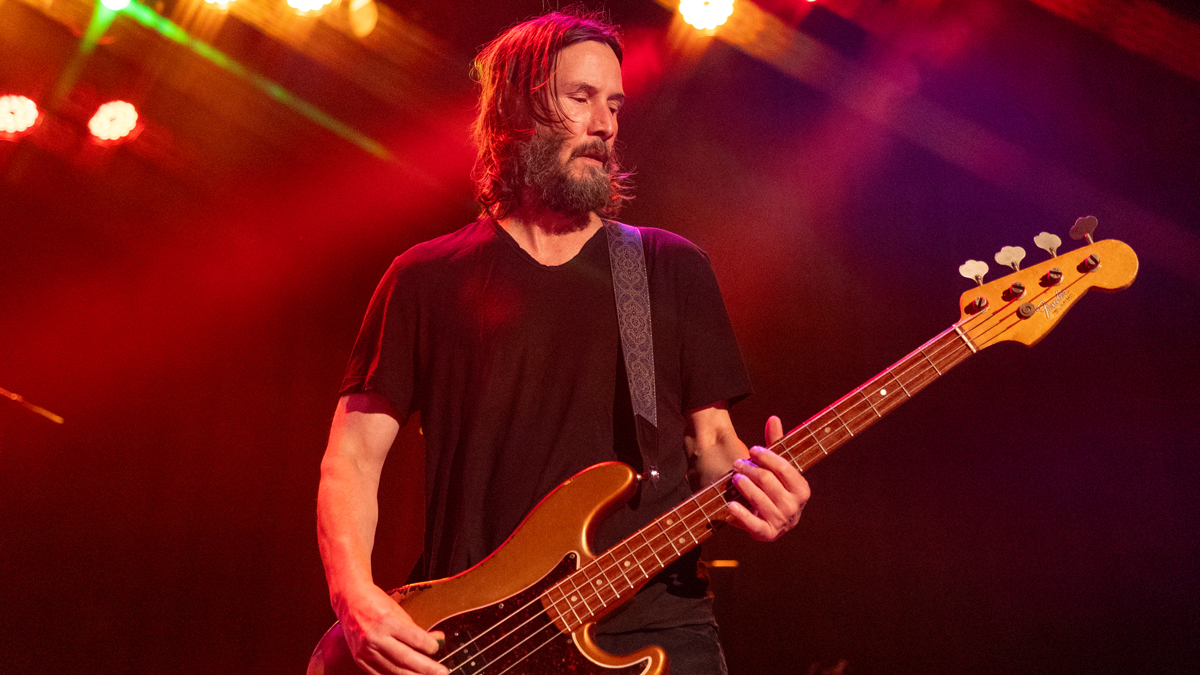
All the latest guitar news, interviews, lessons, reviews, deals and more, direct to your inbox!
You are now subscribed
Your newsletter sign-up was successful
The scene opens on a solitary figure in a white, windowless room. Dressed head to toe in black, mid-length hair hanging loosely above his shoulders, the man lifts his gaze from the floor. There’s a calm composure to his movements – the kind of self-assuredness that can only be attained by spending the best part of four decades saving the world, whether by massacring hordes of suits or reaching musical nirvana.
He sweeps the hair out of his face with both hands and casts his eyes towards the camera.
“Good morning,” he says. “It’s an honor to speak with you and to talk basses and music.”
Interviewing Keanu Reeves is not like interviewing other bass players. This is the man who brought life to John Wick, Neo and Ted ’Theodore’ Logan – a distinctly spiritual star whose good deeds have awarded him an almost saint-like status among his many acolytes. And he’s achieved it all while shunning social media and avoiding the internet in general.
So when Fender reached out to offer Bass Player an exclusive interview with one of Hollywood’s most beloved yet unknowable figures, we enthusiastically accepted – but weren’t quite sure what to expect.
Fortunately, even on the subject of bass, Keanu Reeves’ reputation is not for naught. So what awaited us was irrepressible enthusiasm, unfaultable manners and philosophical musings that springboard from one to the other at a breathless pace. It’s as if his mind is operating in bullet time.
Flipping the script
So, here’s the pitch: cinema icon Keanu Reeves partners with storied California guitar firm when his noughties alt-rock outfit, Dogstar, reforms for a series of 2022 live dates after over two decades away. The trio – which also features guitarist/frontman Bret Domrose and drummer Robert Mailhouse – go on to release their third album, Somewhere Between the Power Lines and Palm Trees, in October 2023.
All the latest guitar news, interviews, lessons, reviews, deals and more, direct to your inbox!
The actor approaches Fender to discuss the brand’s latest basses. Those conversations turn into a short film, Don’t Quit Your Day Dream, an 11-minute documentary that finds Reeves taking viewers on a journey through his passions outside of acting, both musical and motorcycle-based. If that sounds compelling, it’s because it is: the clip has had almost two-million views in just two months.
After what he describes as a long period of “musical hibernation”, Reeves credits Fender and their collaborative efforts as “such a [big] part of waking up out of the cave”.
“I feel really fortunate to be able to use the platform of Don’t Quit Your Day Dream with Fender in that idea of following passions,” he enthuses of his double life. “I want my cake and to eat it, too. I love acting so much and I love playing in the band and making music and writing music. And hopefully I can do both.”
Low-end for life
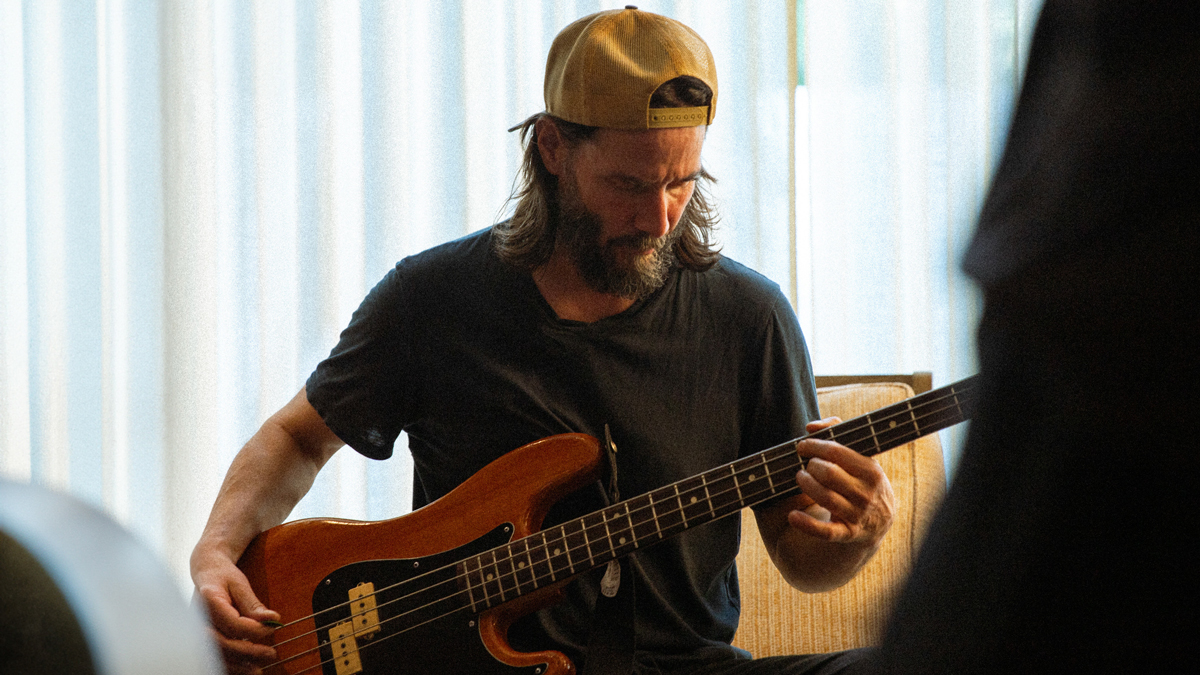
Music has always gone hand-in-hand with acting for Reeves. But where most young listeners would be drawn to melodies, lyrics or rhythms, it was the low-end that captured his imagination.
“Whenever I would listen to music, I was attracted to the bass and lower registers – the way that it would sit in the music. I’m trying to think back to that kid, but I think it’s the same now,” he explains.
“I was just drawn to, like, fucking bass sitting in with the drums and guitar. I’d listen to the Ramones or the Clash or the Pixies or Joy Division. Even when I listened to music on my mom’s record player in the ’70s. I wasn’t conscious then, but I would listen to the basslines in the Beatles. And I just wanted to be able to do that.”
Yet it would be some time before he took up the instrument himself. After a fragmented childhood, which saw him move from Beirut to Sydney, to New York then Toronto – where he attended four different high schools, and was expelled at least once – Reeves made the move to Los Angeles at the age of 20. Two years later, he bought his first bass, a white Ibanez, from the parking lot at Guitar Center Hollywood – a transaction he would later jokingly describe as “like a bass drug deal”.
When I got one, I loved the physicality of the bass, the weight, the strings. And just trying to sit in with the drums and guitar
“I didn’t know if I’d like playing the bass,” he admits of his tentative first steps on the instrument. “But when I got one, I loved the physicality of the bass, the weight, the strings. And just trying to sit in with the drums and guitar.”
Rather than launching straight into learning songs, he bought a music theory book and focused on exercises to hone his chops. Now, he regrets not figuring out the music he loved during those formative years.
But perhaps that influenced how Reeves views the bass as a foundational instrument – the totem around which his Dogstar bandmates carve their own contributions. Yet when I posit that stands in contrast to Reeves’ role as a leading man, he’s quick to counter.
“I mean, that’s kind of you to say about the acting career. I feel like in my acting career, I’ve done a lot of supporting roles as well,” says the man who portrayed two of the biggest action heroes of the past quarter-century. “And I’m actually in a trio, so it’s even more prominent.”
He stops to consider his role. “I love being in between the guitar and the drums,” he ponders. “I love being that kind of intersection. In our band, the drummer oftentimes likes to respond to the singer, to the guitar, but he kind of plays on the back half of the beat, and the guitar player likes to push. In the feeling of our songs, I either hang back or I support the pushing.”
Keanu Reeves faces the music

As you’d perhaps expect from The Nicest Man in Hollywood, Reeves is resolutely modest about his musical abilities. He readily admits he isn’t a flashy bassist, either in his technique or stage presence. A devout pick acolyte (he proudly holds a green 0.88 Dunlop Tortex up to the camera at one point), he self-effacingly describes himself as a “fucking shoe-staring bass player” who tends to “stay in his rock and roll lane”.
Yet YouTube features videos with titles like ’Keanu Reeves Slaps the Bass like John Wick Slaps Fools!’, referring to his brooding onstage demeanor. His growling grunge-inflected tone anchors choice Dogstar cuts like Breach, while Overhang finds him bearing his new wave soul with a series of melodic Peter Hook-indebted lines.
In an era where Instagram algorithms increasingly favor the fastest playing imaginable, Reeves’ approach is refreshingly unfussy – and perhaps that’s exactly because he steers clear of the internet at large.
Schooled on Hook and the Cure’s Simon Gallup, he admits his music tastes haven’t changed much. “I haven’t been looking into or looking around at different individual bass players,” he says of his recent discoveries.
“I love the basslines in Interpol, the Killers, Radiohead. You know, the basslines in Radiohead and Interpol are so… that thing: I love the way the basslines sit in the music. How they’re a primary element to the music that everything else kind of comes around, to my interpretation.”
He tries to conjure other names, before his face lights up. “There was one gentleman who does a demonstration for [renowned bass amp company] Gallien-Krueger that blew my mind,” he enthuses. “Oh my god, I’m so sorry, I’m forgetting the gentlemen’s name!”
He takes to his phone. “Man, I’m gonna text [GK head of artist relations] Forest Gallien. I’m sorry. It was just so good.”
Old Dogstar, new tricks
While Keanu taps out a text message, we recap the Dogstar story so far. The band started in 1991 after Reeves and drummer Robert Mailhouse bonded over their shared love of hockey and music in a supermarket. After two albums, not to mention support slots with David Bowie and Bon Jovi, the group folded in 2002.
During that time, The Matrix became a box-office sensation, and with it, Reeves a global superstar. His increasingly busy schedule became an obstacle to Dogstar’s own success.
“I felt bad for Bret and Rob sometimes, because there might have been times where it could have just kept going with the band,” Reeves concedes. “For like five years pretty much straight we went on tour during the summer. But the band would have to shut down in terms of touring when I was working.”
The film career went from strength to strength, and Dogstar went on the backburner. There were occasional jams over the years, but their return proper was borne of Covid. With the film industry all but shut down, Reeves had time to play – and eventually quarantine – with his bandmates.
“When we got back together, we didn’t know how it would go and we just wanted to have fun,” Reeves says of the rehearsals. “Bret Domrose at the time was living in San Jose, and so he would come down. And we woodshedded for a few weeks, just to see if we could [still] play. And it was going pretty well.
“We started writing songs, and then the idea of making a record organically happened fast. And so we just started to try to write. And we came up with 15 songs and then went into the studio.”
The fruits of their labor emerged late last year, but even with the new record to promote, the band weren’t intending to embark on any extensive touring. Then the 2023 Writers Guild of America strike happened.
“Hollywood went on strike,” Reeves says. “There was a writers’ strike and then the actors’ strike. One film I was working on shut down and then another film that I was supposed to do shut down.
“And so speaking with the band, we were like, ’You guys wanna keep touring?’ And the answer was ’Yes!’ I call them tour-ettes because we’ve just been doing like 12, 13, 14 shows.”
As to whether his now-resuming film projects will curtail Dogstar’s activities, Reeves isn’t sure. But the band have four new songs in the works, which they’re debuting at their ongoing live shows, and are looking to record a new album this year – “the hope and dream”, as Reeves puts it.
Party on, dudes
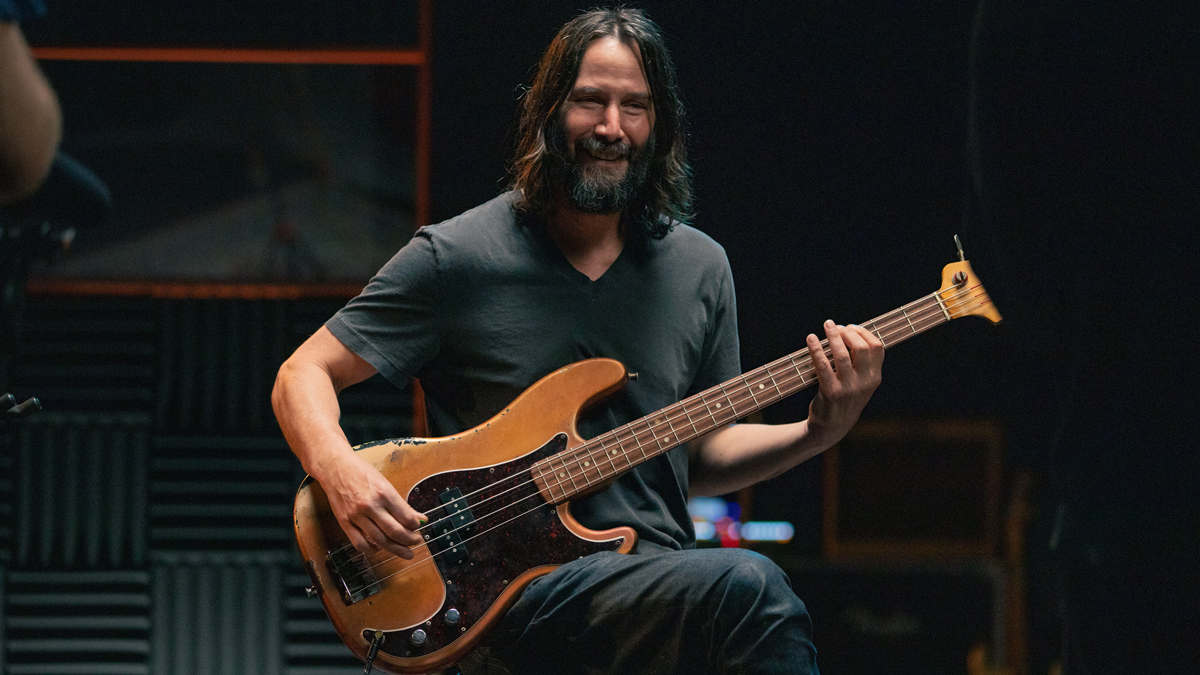
For all his enthusiasm for the craft, Reeves’ musical and acting worlds have rarely collided off-camera. He briefly recalls jamming with River Phoenix while filming My Own Private Idaho – the 1991 Gus Van Sant flick that also featured Red Hot Chili Peppers bassist Flea, who gave Reeves a bass lesson… of a kind.
“He’s such an amazing artist and person, and he didn’t give me a technical lesson; he gave me a philosophical lesson,” he recalls, “which reminds me of surfing. It’s like you’ve just got to go do it and you’ve got to feel it.
“You know, I could give you technique – ‘Here’s your balance, here’s a way to duck, here’s a way to get on the board, here’s how to pop up.’ But eventually, you’ve got to be in the water, and you have to learn about the water and learn about a wave, and you learn by doing it.
“He wasn’t giving me, like, ’OK, when you’re slapping, try not to use too much of your arm and just stay with your hand,’ you know? It was just like, ‘Play it, feel it.’ I thought that was profound.
“I’m still trying to learn how to ‘play it, feel it’. That’s a never-ending journey, isn’t it?”

On-camera, Reeves’ efforts were more prolific. His first musical performance onscreen was with a Fender Stratocaster in 1988 drama Permanent Record, which paved the way for one of his most iconic roles as Ted ‘Theodore’ Logan in Bill & Ted’s Excellent Adventure the following year.
Reeves had a few guitar lessons to approximate the hair-metal heroics of the film’s heroes, but in reality, both he and Alex Winter are bass players. And while it was never considered that the films’ stars would tackle four-strings in the movie, the pair did have some unorthodox jams in between filming.
“It would be like two-bass jams,” Reeves recalls. “That was wacky, good fun. Someone would start a central riff, and the other person would move around whatever that riff was… At the time, I won’t say that there wasn’t any weed involved!”
“And then I might throw in maybe some distortion,” he continues. “Once in a while when I played by myself, I would put the old distortion pedal through it. The jam space at my house in the ’90s had a Marshall amp, and sometimes I played the bass through the Marshall head and played with the distortion there, which I thought was cool.”
Gear. Lots of gear

Those guitar amp experiments are about as radical as Reeves dares to get with bass gear. During Dogstar’s original tenure, he played a Music Man and landed a Fernandes sponsorship as his star rose. But when the band returned, he returned to the root of the electric bass: the Fender Precision.
We were particularly captured by the ’65 P-Bass that features in Don’t Quit Your Day Dream – an especially stunning vintage specimen in a heavily worn dark orange finish that the bassist proclaims to have “the best neck I’ve ever played”.
“I believe that in the fog of life and the fog of rock, I picked that bass up at Guitar Center Hollywood in their vintage room,” he says of his prize, “and [the year] has been confirmed! I went to the Fender factory and one of the master craftspersons there, Dave Brown, he took the neck off, and the serial number confirmed it, but then you saw the neck and you’re like, ’Okay it’s a ’65.’ But we learned that the electronics had been customized.”
More recent Dogstar shows have found Reeves in the company of a factory-fresh P-Bass, however – and one with an unfamiliar finish, no less.
“I recently worked with [Marketing & Artist Relations Manager] Billy Siegle at Fender, who helped organize and who I met with. So he offered up doing a custom color American Vintage II.
“We did a Royal Blue Burst, and I’ve been playing that recently live. I mean, the P-Bass is my favorite bass,” he concludes, before producing a natural-finished Precision seemingly out of nowhere and noodling on-camera. “My 1974 – she’s at home with me. I just love it.”
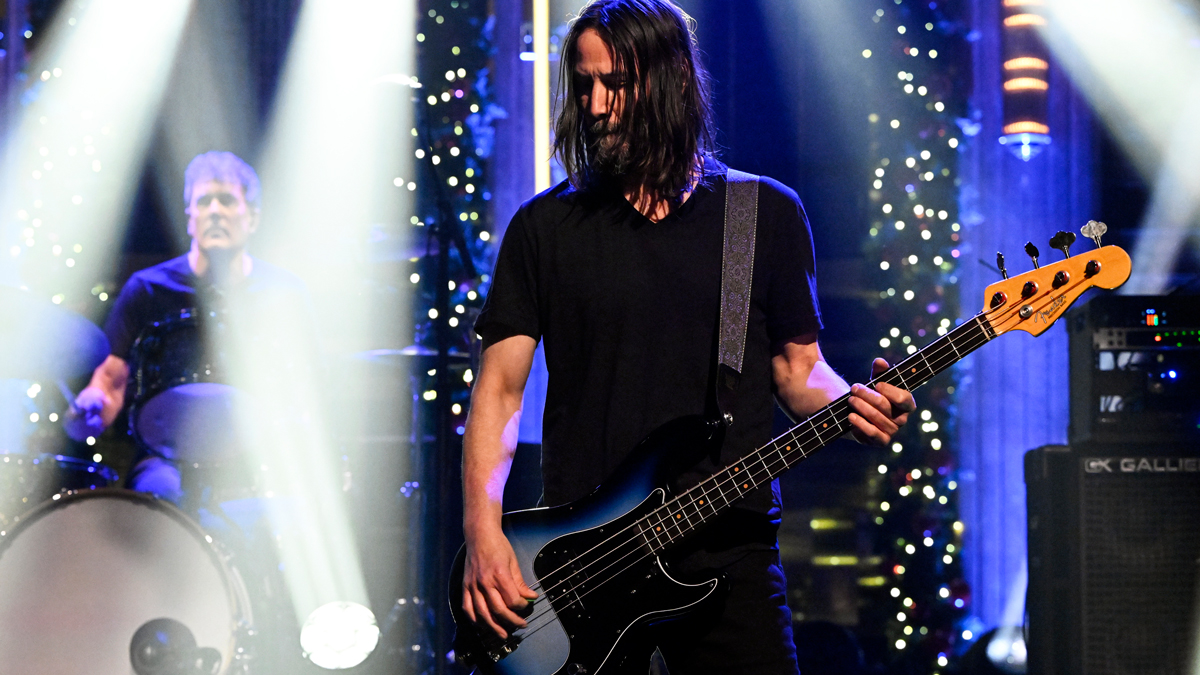
Yet for all the internet predictions of a Keanu Reeves signature bass, the Hollywood star insists such an accolade is not on the cards.
“You’d have to talk to Fender about that,” he laughs. “I mean, I wouldn’t feel worthy of that. Maybe if it came out because the color was custom. But let’s be real, man: I’m not a shredder. I could play a rock song, but I’m not a shredder. I’m certainly passionate about it and enthusiastic, but I ain’t no shredder.”
Reeves certainly isn’t one to overcomplicate things. He maintains he doesn’t have a vast bass collection. His guitar arsenal consists of a Stratocaster, an acoustic (“which I think is a Fender as well… It might be a Guild”) and an unknown acoustic from the latest Bill & Ted movie (“I guess I should know that, but I don’t”).
I wouldn’t feel worthy of [a signature bass]… Let’s be real, man: I’m not a shredder
He also steers clear of pedals these days, and his only concessions to modern technology are a Shure AD4D wireless system and a monster new Gallien-Krueger rig.
“I had an 800 RB when we were playing in the ’90s and into the early ’00s,” he says. “Epic, legendary amplifier. And then as this [Dogstar] incarnation came back, I wanted to revisit Gallien-Krueger and see what they had cooking, and I was introduced to Forest Gallien, the son of Bob Gallien, who was the head of GK – the mad, beautiful scientist of bass sound.
“I ended up with the 1200 Fusion X. And then playing through the RVH [cab], which is 810s. And that amplifier is beautiful. Any style you want to play – you know, I play rock, but there’s the tone controls and it’s got a tube preamp, so there’s a warmth to it. And the cabinets are a great obvious fit with the amplifier and they’re working out very well. And so that was cool, to kind of modernize.”
Be excellent to each other
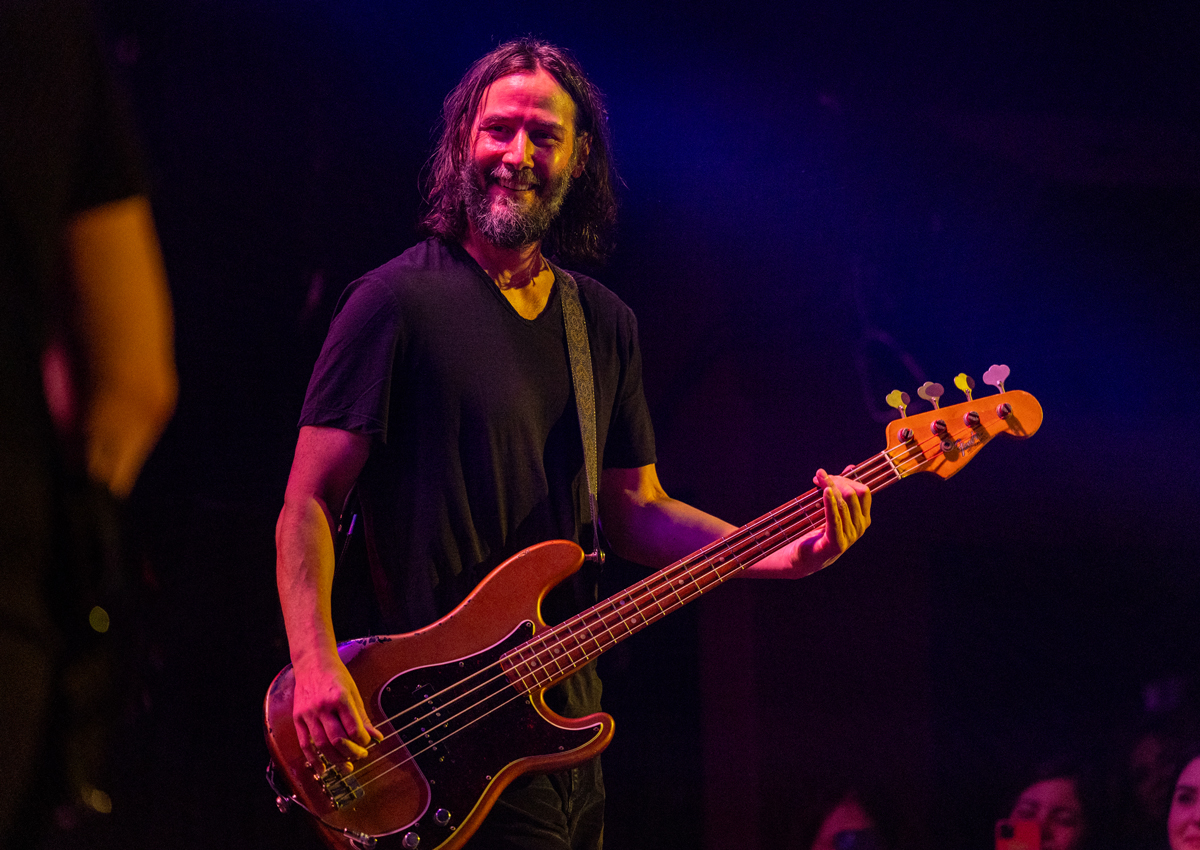
By this stage, we’re reaching the climax of our conversation: the clock is ticking down, so I throw Reeves my most out-there question. I name three of his most iconic roles, and ask: what kind of bass would they play?
We start with John Wick.
“Okay, there’s two things with John Wick,” Reeves muses. “He could either just go straight, you know, Fender P… or he might play a Jazz. Yeah, let’s just say he’s going pure Jazz. Fender Jazz.”
Next up, Neo.
“Neo playing a bass…” Reeves begins laughing like an excited kid. “Let’s give Neo an upright bass. He’s probably going to want to play some jazz. Thomas Anderson on upright. With Morpheus on drums. We’ll be a power trio. [laughs] And maybe we could get Agent Smith on the keys.”
And Ted ’Theodore’ Logan, assuming he had to put down the guitar and play a bass?
“Oh, definitely a seven-string. And he’d just be exploring all of the different kinds of scaling – it would be a seven-string fretless.”

I, for one, am glad we’ve got all this on record. But before we part ways, Reeves has some concluding thoughts.
“I love music,” he begins, “and I’ve seen the impact that music has with my friends’ kids, with friends who still play, and I’m grateful to be a part of sharing my passion for it, but also seeing what a positive thing music is. And trying to promote the idea of playing music whether it’s young or old.
“I’ve been really honored to be a part of such a legendary, cool company as Fender. And especially since I play their instruments, it was super-organic. It’s really been an honor.”
It feels like a fitting end, a satisfying conclusion. But as we say our goodbyes and my touchpad hovers over the ’end call’ button, Reeves reaches out to the camera, yelling, “Wait! Wait!”
There’s a post-credits scene.
He’s just had a text from Forest Gallien, who has revealed the name of the demonstrator who so impressed Reeves.
“Thad Johnson,” he exclaims, as he recognizes the Grammy-winning gospel MD. “Thad Johnson! Oh my gosh.”
He proceeds to look up the YouTube video of the demo that took his breath away, and holds his phone up to the camera, enthusiastically voicing his approval.

After we watch a full minute of Undefeated by Kenny Lewis & One Voice – Studio Session via this intimate medium, complete with live Keanu commentary (“He’s amazing! The taste! And the technique! Shredding!”), we’re all out of time.
“Thank you, sir,” Reeves signs off. The screen fades to black, but there are no credits. I switch off my recording app, take a breath and reflect on what I just witnessed: one of the most famous movie stars on the planet, nerding out like a teenager over desirable gear and extraordinary players. The enthusiasm is infectious.
So I intend to do as Keanu says: don’t quit your daydream. Keep it with you, in the corner of your mind, whatever else you end up doing. It’s what Keanu would want for you. For all of us. And you don’t want to let Keanu Reeves down, do you?

Mike has been Editor-in-Chief of GuitarWorld.com since 2019, and an offset fiend and recovering pedal addict for far longer. He has a master's degree in journalism from Cardiff University, and 15 years' experience writing and editing for guitar publications including MusicRadar, Total Guitar and Guitarist, as well as 20 years of recording and live experience in original and function bands. During his career, he has interviewed the likes of John Frusciante, Chris Cornell, Tom Morello, Matt Bellamy, Kirk Hammett, Jerry Cantrell, Joe Satriani, Tom DeLonge, Radiohead's Ed O'Brien, Polyphia, Tosin Abasi, Yvette Young and many more. His writing also appears in the The Cambridge Companion to the Electric Guitar. In his free time, you'll find him making progressive instrumental rock as Maebe.



